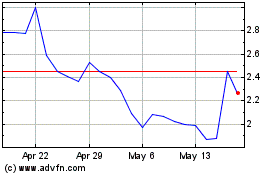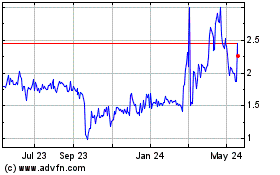Study by BAMC’s Michael Morris, M.D., and
VA’s Sheila Habib, M.D., evaluated potential economic impact of
CyPath® Lung for the early detection of lung cancer
A new economic study found that adding CyPath® Lung, bioAffinity
Technologies’ noninvasive test for detection of early-stage lung
cancer, to the standard of care for Medicare patients with a
positive lung cancer screening could have saved an average of
$2,773 per patient for total cost savings of $379 million in 2022.
The peer-reviewed study, “Economic Evaluation of a Novel Lung
Cancer Diagnostic in a Population of Patients with a Positive
Low-Dose Computed Tomography Result,” attributes the savings to a
reduction in follow-up diagnostic assessments, expensive follow-up
procedures and procedure-related complications.
Michael J. Morris, M.D., Brooke Army Medical Center (BAMC)
pulmonology and critical care physician and Assistant Dean of
Research at San Antonio Uniformed Services Health Education
Consortium (SAUSHEC), and Sheila A. Habib, M.D., Director of the
Pulmonary Lung Nodule Clinic and the Lung Cancer Screening Program
at the South Texas Veterans Health Care Systems’ Audie L. Murphy
Memorial Veterans Hospital and Assistant Professor at the
University of Texas Health Science Center at San Antonio, were
first and second authors on the study published in the Journal of
Health Economics and Outcomes Research. Economists John E.
Schneider, Ph.D., and Maggie L. Do Valle, Master of Public Health,
of Avalon Health Economics also contributed to the study.
The study found that adding CyPath® Lung to the standard of care
for private-payer patients with a positive lung cancer
screening result could have saved even more, an average of $6,460
per patient. A positive screening result was defined as finding a
pulmonary nodule between 6 to 29 millimeters in size. The analysis
estimated total healthcare savings of $895 million if all
individuals screened in 2022 were covered by private insurance.
“Our study suggests the potential for a very positive economic
impact on healthcare costs with the widespread use of CyPath® Lung
in the early diagnosis of lung cancer,” Dr. Morris said. “CyPath®
Lung closes a widely recognized gap in the screening and diagnosis
of lung cancer. From the patient perspective, it is noninvasive and
easy to use. From the physician perspective, CyPath® Lung’s
demonstrated high sensitivity, specificity and accuracy give us a
clearer picture of how to proceed.”
“Most important, integrating companion tests like CyPath® Lung
into the standard of care for high-risk patients has the potential
to help us diagnose lung cancer earlier when treatment is more
effective, saving or extending lives,” Dr. Habib said. “The study
demonstrates CyPath® Lung’s potential to improve outcomes by
reducing delays in diagnosis and reducing both the number of
unnecessary procedures and any medical complications they could
cause.”
Since the National Lung Cancer Screening Trial (NLCST) released
initial findings in 2010, multiple studies similarly concluded that
annual screening by low dose computed tomography (LDCT) for
high-risk patients reduces lung cancer mortality. But LDCT also has
a relatively low positive predictive value, and there is often not
a clear diagnostic recommendation for smaller, indeterminate
pulmonary nodules. The common choices are to “wait and see” what
the next scan reveals or proceed with an invasive procedure,
including biopsy, that may turn out to be unnecessary.
The economic model used in the Morris, et al., study evaluated
the impact of adding CyPath® Lung to the diagnostic pathway for
individuals with a positive LDCT, including patients with a primary
lung cancer diagnosis. Cost calculations included procedure
expenses, the cost of complications and adverse events due to a
procedure, and diagnostic assessment costs.
The study considers the likelihood of clinicians’ use of five
specific follow-up procedures based on published, peer-reviewed
studies (CT, positron emission tomography (PET), CT-guided biopsy,
bronchoscopy, and surgical biopsy), the documented rate of
complications for each procedure, and the cost of post-procedure
diagnostic assessments. The most common complications included
pneumothorax, pneumothorax requiring a tube, and hemorrhage.
The economic model for the study assumed two cohorts: one in
which all patients were covered by Medicare and one in which all
patients were covered by commercial insurance. The total savings
related to each cohort are not additive. An independent and
validated source for the percentage of patients who had Medicare,
private insurance or a combination of insurance coverage in 2022
was not available for the analysis.
Base prices for the Medicare analysis were based on Medicare
2023 national payment data by Current Procedural Terminology (CPT)
codes, and costs for the private payer analysis were determined by
using a 2.64 multiplier. The Medicare payment set by the Centers
for Medicare and Medicaid Services (CMS) for the CPT code specific
to CyPath® Lung was used in the study. The projected cost savings
reported in the study are primarily due to reductions in follow-up
diagnostic procedures after adding CyPath® Lung to the diagnostic
pathway between screening and diagnostic follow-up procedures.
bioAffinity Technologies funded the work of Avalon Health
Economics. Dr. Morris and Dr. Habib were not compensated for their
work on the study.
The views expressed in this press release do not necessarily
reflect the official policy or position of the Defense Health
Agency, the Department of Defense, the Veterans Health
Administration, the Department of Veterans Affairs or any other
government agencies.
About CyPath® Lung
CyPath® Lung uses proprietary advanced flow cytometry and
artificial intelligence (AI) to identify cell populations in
patient sputum that indicate malignancy. Automated data analysis
helps determine if cancer is present or if the patient is
cancer-free. CyPath® Lung incorporates a fluorescent porphyrin,
meso-tetra (4-carboxyphenyl) porphyrin (TCPP), that is
preferentially taken up by cancer and cancer-related cells.
Clinical study results demonstrated that CyPath® Lung had 92%
sensitivity, 87% specificity and 88% accuracy in detecting lung
cancer in patients at high risk for the disease who had small lung
nodules less than 20 millimeters. Diagnosing and treating
early-stage lung cancer can improve outcomes and increase patient
survival. For more information, visit www.cypathlung.com.
About bioAffinity Technologies, Inc.
bioAffinity Technologies, Inc. (Nasdaq: BIAF) addresses the need
for noninvasive diagnosis of early-stage cancer and diseases of the
lung and broad-spectrum cancer treatments. The Company’s first
product, CyPath® Lung, is a noninvasive test that has shown high
sensitivity, specificity and accuracy for the detection of
early-stage lung cancer. CyPath® Lung is marketed as a Laboratory
Developed Test (LDT) by Precision Pathology Laboratory Services, a
subsidiary of bioAffinity Technologies. For more information, visit
www.bioaffinitytech.com and follow us on LinkedIn, Facebook and
X.
Forward-Looking Statements
Certain statements in this press release constitute
"forward-looking statements" within the meaning of the federal
securities laws. Words such as "may," "might," "will," "should,"
"believe," "expect," "anticipate," "estimate," "continue,"
"predict," "forecast," "project," "plan," "intend" or similar
expressions, or statements regarding intent, belief, or current
expectations, are forward-looking statements. These forward-looking
statements are based upon current estimates and assumptions and
include statements regarding the potential economic impact of
adding CyPath® Lung to the standard of care for patients with a
positive lung cancer screening for an average of $2,773 per
Medicare patient and an average of $6,460 per private-payer
patient, total healthcare savings of $895 million if all
individuals screened in 2022 were covered by private insurance, how
integrating CyPath® Lung into the standard of care for high-risk
patients has the potential to help diagnose lung cancer earlier
when treatment is more effective, and CyPath® Lung’s potential to
improve outcomes by reducing delays in diagnosis and reducing both
the number of unnecessary procedures and any medical complications
they could cause. These forward-looking statements are subject to
various risks and uncertainties, many of which are difficult to
predict that could cause actual results to differ materially from
current expectations and assumptions from those set forth or
implied by any forward-looking statements. Important factors that
could cause actual results to differ materially from current
expectations include, among others, CyPath® Lung’s ability to
generate cost savings and to help diagnose lung cancer earlier and
the other factors discussed in the Company’s Annual Report on Form
10-K for the year ended December 31, 2023, and its subsequent
filings with the SEC, including subsequent periodic reports on
Forms 10-Q and 8-K. Such forward-looking statements are based on
facts and conditions as they exist at the time such statements are
made and predictions as to future facts and conditions. While the
Company believes these forward-looking statements are reasonable,
readers of this press release are cautioned not to place undue
reliance on any forward-looking statements. The information in this
release is provided only as of the date of this release, and the
Company does not undertake any obligation to update any
forward-looking statement relating to matters discussed in this
press release, except as may be required by applicable securities
laws.
View source
version on businesswire.com: https://www.businesswire.com/news/home/20240918328082/en/
bioAffinity Technologies Julie Anne Overton Director of
Communications jao@bioaffinitytech.com
Investor Relations Dave Gentry RedChip Companies Inc.
1-800-RED-CHIP (733-2447) or 407-491-4498 BIAF@redchip.com
bioAffinity Technologies (NASDAQ:BIAF)
Historical Stock Chart
From Dec 2024 to Jan 2025

bioAffinity Technologies (NASDAQ:BIAF)
Historical Stock Chart
From Jan 2024 to Jan 2025
